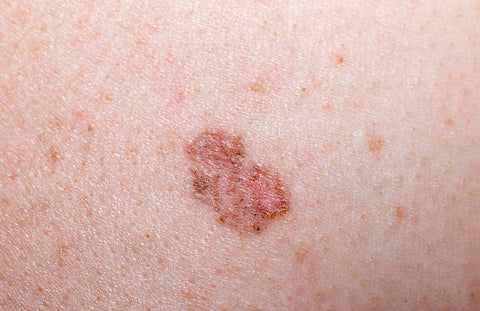Basal cell carcinoma (BCC) stands as the most prevalent type of skin cancer. This slow-growing malignancy takes root in the outer skin layer, often spurred by sun exposure. The face, scalp, neck, arms, and hands are common areas of occurrence.

Left untreated, BCC can escalate, causing tissue damage and disfigurement. In severe cases, it may even spread to other organs, posing more serious health risks.
Root Causes of Basal Cell Carcinoma:
Though the exact cause remains elusive, certain factors elevate the risk of BCC:
- Fair Complexion: Those with fair skin, light hair, and blue eyes are more prone.
- Age: While it can affect anyone, older adults are more commonly affected.
- Genetics: Genetic predispositions can play a role.
- Weakened Immune System: Individuals with suppressed immune systems, like those with HIV/AIDS or on immunosuppressive meds, are at higher risk.
- Chronic Skin Conditions: Conditions like psoriasis, eczema, or severe acne may increase vulnerability.
- Chemical Exposure: Certain chemicals, like arsenic, may contribute.
- Previous Radiation: Past radiation therapy can heighten susceptibility.
Recognizing Basal Cell Carcinoma:
- Skin Lesions: Pale, waxy, pearly, or flesh-colored bumps are common.
- Skin Color Change: Darker or redder patches can emerge.
- Open Sores: Non-healing sores may appear.
- Bleeding: Bleeding or oozing could occur.
- Scaling and Crusting: Lesions might develop a scaly or crusted surface.
- Scar-Like Appearance: In advanced cases, it might resemble a flat, flesh-colored scar.
Diagnosis:
Diagnosing BCC primarily involves a physical examination. A biopsy may be performed, involving the sampling of tissue for microscopic analysis. Imaging tests like X-rays or CT scans can aid in confirming the diagnosis's extent.
Treatment Options:
- Surgery: Removal of the tumor and surrounding tissue is common.
- Cryosurgery: Freezing the tumor with liquid nitrogen is effective for small BCCs.
- Radiation Therapy: High-energy X-rays or particles target cancer cells.
- Topical Medications: Creams or gels like imiquimod can treat surface BCCs.
- Photodynamic Therapy: A light-sensitive medication combined with light exposure eradicates cancer cells.
Regular follow-ups are vital post-treatment to ensure the cancer hasn't recurred or spread. Prevention, including UV protection, remains crucial to lower future BCC risk.
Remember, a professional medical evaluation is essential for accurate diagnosis and tailored treatment.
Author: Nikita Vishnoi BCA












